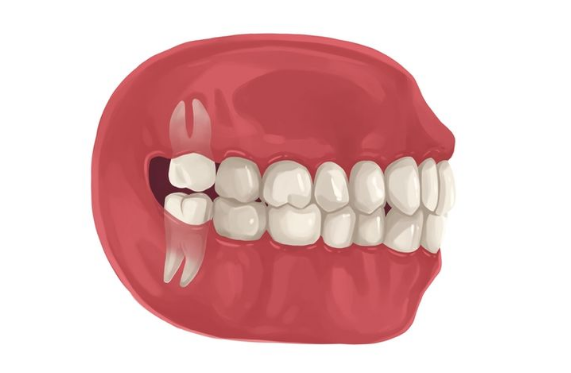Wisdom Teeth: What You Need to Know About Your Last Molars
Did you know that some of our teeth grow in last when we are between the ages of 17-25? Yep, those teeth are called wisdom teeth. If we assume a blood relationship, the youngest is also the last child. That's why the last teeth are called wisdom teeth. Let's learn more about this wisdom tooth.
BODY HEALTHWISDOM TEETHIMPACTED WISDOM TEETH
11/19/20242 min read


normal wisdom teeth
Wisdom teeth are the last molars that come out or grow on the surface of the backmost gums. As the last tooth to come out, sometimes these teeth do not get enough space to grow from the gums. This can lead to a dental health problem called dental impaction, where the wisdom tooth is impaired in its growth - it does not have the perfect space or place to grow. As a result, the tooth only comes out partially or not at all from the gums, causing an unpleasant feeling in the mouth.
📝Read more : What is Tooth Impaction ?
Symptoms of Wisdom Teeth Growth
In general, the growth of wisdom teeth does not cause any symptoms, unless the wisdom teeth that grow are impacted. Symptoms of impacted wisdom teeth include:
Pain in the teeth and gums
Gum swelling; abscess
Strained or swollen jaws and pain under the ears 4.
Bad breath
Pain when opening the mouth / jaw sounds when opening the mouth 5.
Feeling uncomfortable / there is a feeling of blocking when eating
headache/dizziness
Treatment of Impacted Wisdom Teeth
Treatment of impacted wisdom teeth can be adjusted according to their severity. In cases that do not cause any symptoms, the doctor can do two things, namely just monitoring the condition of the wisdom teeth regularly or removing the teeth to avoid the possibility of severe complications in the future.
If the wisdom tooth impaction causes symptoms, the doctor will immediately remove the wisdom tooth through a minor surgical operation with two possible anesthesia used,
Local anesthesia: Suitable for minor, straightforward extractions.
General anesthesia: Used for complex extractions or when multiple teeth need removal.
which will be adjusted according to the condition of the impacted wisdom tooth. If the wisdom tooth has deep roots and more than one impacted tooth, the doctor will use general anesthesia so that the patient can feel comfortable during the extraction.
After the tooth extraction procedure, some patients will feel side effects which are generally the side effects of using anesthesia, such as:
Pain in the area of the tooth that has been extracted
Swelling of the face and mouth
Mouth feels numb or tingling
The jaw feels stiff or tense
Unable to open your mouth wide
During the recovery period, the doctor will give painkillers, such as ibuprofen and paracetamol. The doctor will also advise the patient to do the following:
Do not smoke
Avoiding alcoholic beverages
Eating soft or liquid foods as well as cold temperatures
Avoiding hot food as it may slow down the swelling recovery process
recovery period after a tooth extraction can vary, generally around 2 weeks or less. During the recovery period, the doctor will monitor the condition of the patient's gums to ensure that there are no complications, such as infection in the area that received the sutures or severe pain due to inflammation of the jawbone.
Complications of Wisdom Teeth
If not treated properly, impacted wisdom teeth can lead to the following complications:
Infection
Tooth decay
Stacked teeth
Periconitis, which is an inflammation of the gums and wisdom teeth 6.
Decreased appetite because it is likely that when eating the gums will bleed
Prolonged headache
Wisdom teeth are a natural part of dental development, but they can sometimes cause significant discomfort and health problems if they develop an impaction condition. Regular dental check-ups and timely treatment can help prevent more serious complications from the impaction condition itself. If you are experiencing symptoms of impacted wisdom teeth, consult your dentist to explore the best treatment options for maintaining optimal oral health.
